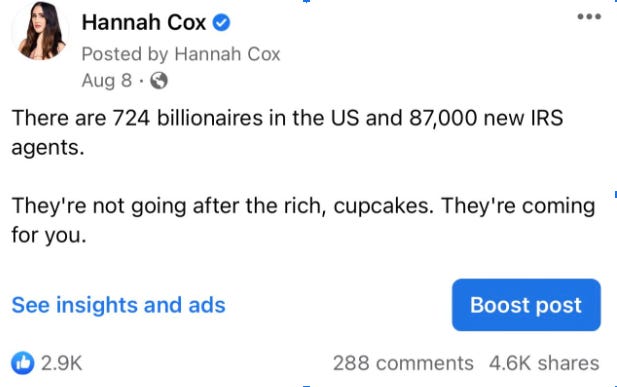Facebook says posts without government talking points are 'missing context'
Under the absurdly named “Inflation Reduction Act,” Congress recently more than doubled funding for the IRS which will lead to an expansion of around 87,000 new agents. Political leaders have had the audacity to assert that this expansion will only impact those making over $400,000 per year.
This math, quite obviously, does not track. Even as things stand, the IRS is way more likely to audit poor and middle class families than it is “the rich.” And according to a study by the nonpartisan Joint Committee on Taxation, 80% of new IRS revenue will come from small businesses earning under $200,000.
I made this point in a post that went viral across social media a few weeks ago.

What was the missing context?

Oops, silly me. I forgot to include the government’s propaganda pinky promise that it wouldn’t impact middle class people.
So essentially, Facebook’s “independent” fact-checkers are merely checking to ensure users tote the government’s own talking points in their posts. Their measure of truth or disinformation is literally just whatever the government’s narrative is at a given moment.
And they weren’t done. A few days later I posted another meme poking fun at the notion that the IRS expansion will only target the rich. It too took off (because even Democrats know the government’s assertion is bogus).


It too was hit with a similar fact-check. Sir, this is a meme. What meme isn’t missing context?
Similarly, my colleague at BASEDPolitics, Jack Hunter, recently tried to post a screenshot from Rand Paul’s Twitter account to Facebook on a fan page for the senator.
Here’s what happened. According to him, it wasn't the first time, either.

Merely sharing the thoughts of a sitting member of Congress apparently gets you locked out of Facebook for a time.
Still, unlike many on the center-right, I’m not going to use this to argue for big government interventions in the market place like antitrust or actual free speech violations like giving the government control over content moderation. Not necessary. Facebook is eating itself in real time. Turns out the free market works, you just have to give it time.
I built my initial platform on Facebook. I’ve used it to reach millions of people with my views and my brand. I’ve used it to organize major-grassroots movements that have led to significant policy reforms. I’ve made money off of it. I’ve springboarded growth on other social media platforms through my initial following there.
But increasingly, my relationship with Facebook feels like we’re slow dancing in a burning room (if you don’t know that John Mayer song, stop and go listen immediately). I have over 35,000 followers on the platform, and those followers constantly complain about not seeing my content in their feeds. Aside from towing water for the government’s narrative, the platform also suppresses views of posts with outside links—increasingly making it impossible to use the website as a news aggregator as many once did.
This is why the company is bleeding users, specifically the younger users who drive consumption and coolness in the market, and its stock price has taken a similar hit. Meanwhile, its competitors like TikTok continue to grow, in large part because they offer a more organic algorithm. This allows content creators to grow quickly if they have a quality product, and it allows users to be introduced to content that appeals to their interests and discover new creators.
Nobody wants a government run social media platform. But it seems that’s the direction Facebook is heading with censorship, government propaganda, bad algorithms, and an inability to anticipate the needs of creators and users. All the traits of government are there: ineffective, behind the times, slow to adapt, and bad PR. It’s cringe and dusty, like a very uncool, boomer hippie parent that still thinks they’re edgy.
No one will mourn its certain death. And let’s hope other social media platforms take heed.
Like this article? Check out the latest BASEDPolitics podcast on Apple Podcasts, Spotify, or below:

